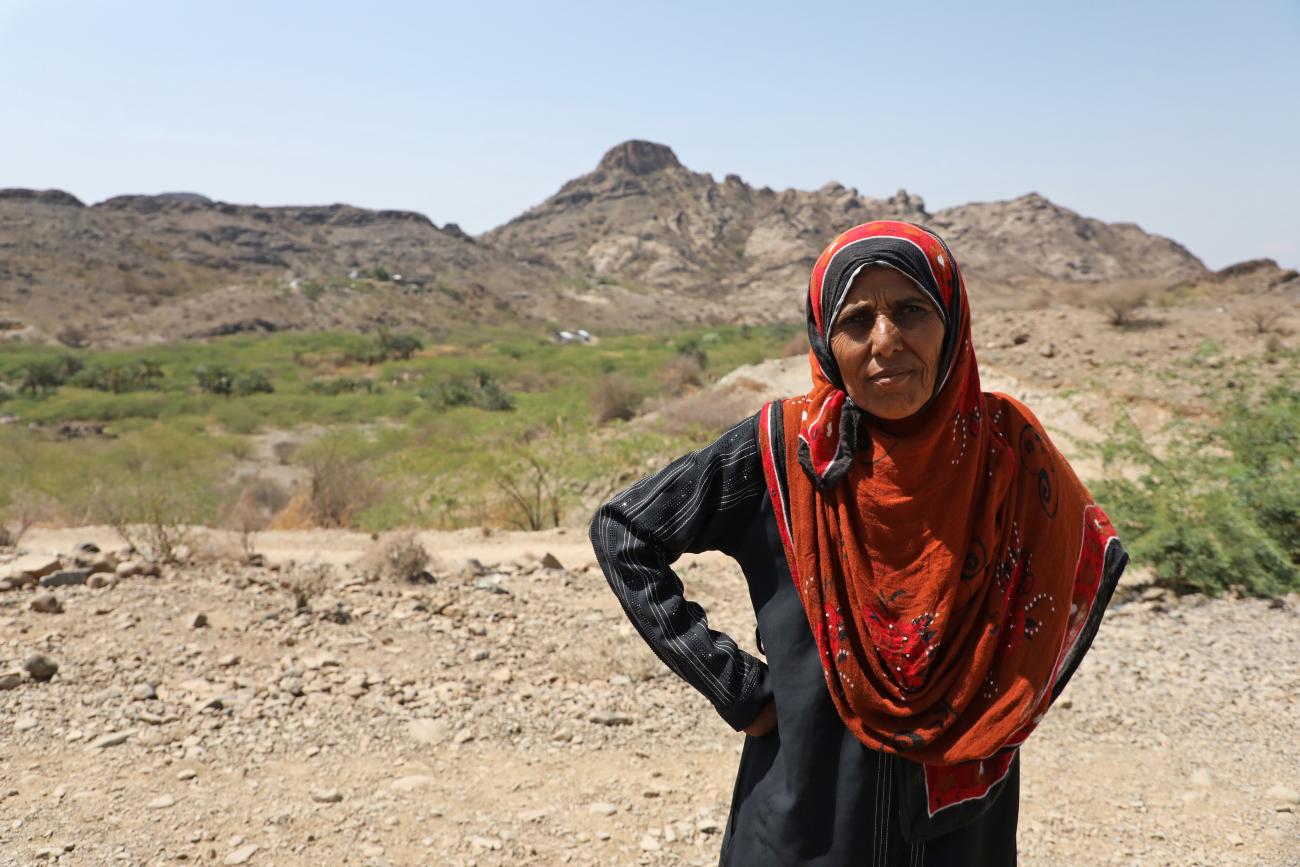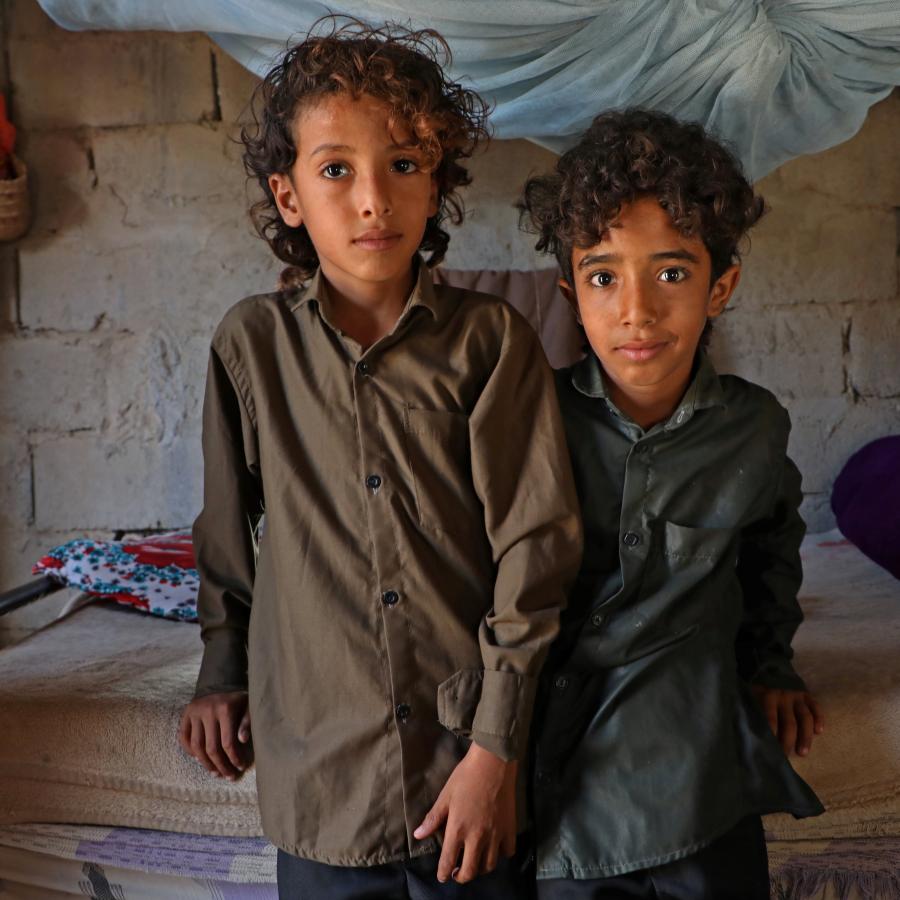IOM Yemen: The Toll of Displacement - Leveraging the Rapid Response Mechanism for Relief

--
West Coast, Yemen
In the beautiful backdrop of Mawza’s mountains, Safia has managed to build a new life for herself after years of struggle and displacement. Originally from a village nearby, she was forced to flee with her family six years along due to the conflict. Since her husband’s passing, Safia has taken on the responsibility of raising her six children alone, determined to create a better future for them.
When the family first arrived in Mawza’, survival was a struggle and school felt like a distant luxury. They used to borrow a donkey so that her 14-year-old daughter Malak could fetch water and help with errands, which left her with no time to attend school. However, things took a turn for the better when Safia received her first cash installment from the International Organization for Migration (IOM).
Eager to give her children the education they deserved, she rushed to register them at the local school. Now, Malak walks to school each day with pride and excitement for the day ahead. With the remaining money, Safia was able to cover basic household costs and her medical expenses.

Rapid Response Mechanism
The family has also received Rapid Response Mechanism (RRM) kits, which have been a lifeline for newly displaced families. This initiative, spearheaded by the United Nations, co-led by IOM and the United Nations Population Fund (UNFPA), delivers swift, life-saving support to those affected by armed conflict and extreme weather events. RRM kits contain essential items such as high-energy biscuits, dates, basic hygiene kits, female dignity kits, water ceramic filters, and blankets, addressing the immediate needs of displaced families for up to seven days.
Following this initial support, the RRM offers multi-purpose cash assistance (MPCA) within 14 to 21 days, enabling families to meet their ongoing needs until longer-term solutions are found. Safia is thankful for the three cash installments she has received, which have enabled her to support not only her own children but also her extended household of 23, including several grandchildren.
The mechanism operates through a structured process: supplies are procured, stored, and pre-positioned across the country and RRM teams mobilize within 72 hours of displacement alerts. This rapid response ensures timely distribution of aid and cash assistance to the most vulnerable families.
In 2023 alone, IOM reached nearly 11,000 households with emergency one-off MPCA, highlighting the significant impact of this programme. The RRM’s comprehensive approach addresses not only immediate survival needs but also supports families in regaining their dignity and stability during crises.
Like any mother, Safia has high hopes for her children. Her older son makes charcoal, providing another source of income, which she hopes will contribute to achieving her dream of opening a small shop for her 14-year-old son. He has struggled to move properly since breaking his leg in a car accident four years ago. Safia is hopeful that he can undergo surgery in a few years to improve his mobility.
The mother also envisions a bright future for her daughter Malak, who aspires to become a teacher. When asked about her favourite subject, Malak confidently replies, “I like them all.”
“I want to provide my children with every opportunity to succeed.” – Safia, Internally Displaced
New Arrivals
A few hundred meters from Safia’s house lives Al-Haji, who recently arrived in the area after fleeing Al Ghalil frontlines with his wife and eight children. They came with nothing, escaping in the middle of the night. A total of 12 other families, amounting to 71 people, made the journey, leading their camel and four donkeys. They were devastated when one of their camels was killed by a rocket along the way.
“Maybe we could have arrived faster, but we had many children with us,” he recounts.
With children on their shoulders and many barefoot, they finally made it to Mawza', leaving behind a vacant village. Al-Haji chose this area because he has relatives nearby and knows the landowner, which gave them hope that they could stay without issues. Upon arrival, they improvised a few makeshift shelters, but life has been far from bearable as they struggled to shield their children from the scorching heat.
Supporting Newcomers
Saleh Al-Rawdhi, Executive Unit Manager of Mawza’, has witnessed many displaced families arriving in the area. Having been displaced himself since 2018, he notes an increase in newcomers each month. In response to this growing need, his team gathers information and works on referrals, collaborating with local organizations to support the newly displaced as quickly as possible.
With the first cash installment Al-Haji’s extended family received, he immediately decided to build a fire pit. With the next two installments, he purchased two sheep and charcoal for the family. The group also received RRM kits, which offered essential support as they prayed for more assistance to arrive. Nowadays, Al-Haji earns a modest income by selling goat cheese, which barely supports his family. He often looks back on the better days behind him when he used to be a farmer.
However, Al-Haji is not new to displacement. In 2018, floods forced his family to leave their home and seek shelter elsewhere. He finds it difficult to imagine that they won’t have to move again.
“Every time I settle, I fear it won’t last,” he confesses. “It feels like we are always starting over,” he says.
Text & Photos: Monica Chiriac|IOM Yemen
FootnotesIOM’s RRM and MPCA assistance in Yemen is funded by USAID’s Bureau of Humanitarian Assistance (BHA), EU Humanitarian Aid Operations (ECHO), UN’s Central Emergency Response Fund (CERF), and Qatar Charity.


